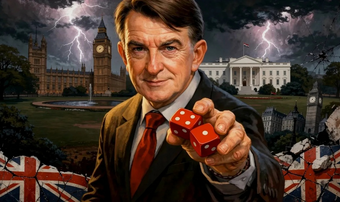Trump, trials and entrapment: how our political failings point to the only one who truly succeeded

It’s been an eventful week. Each Thursday, we sit down at CARE and weigh up what the biggest story of the week is, so we can provide a Christian angle on it. Normally there has been one key headline which has cut through, a story the media have been able to run with for several days. This week, there has been no shortage of material.
On Tuesday, we witnessed the spectacle of Donald Trump becoming the first American President to face criminal charges in America’s history. Put on trial for 34 counts of falsifying business records, accused of committing felony, and paying money to influence the 2016 presidential election in violation of election law (through the hush money paid to Stormy Daniels), Mr Trump denied wrongdoing, and in a typical display of defiance, came out swinging, saying America was ‘going to hell’.
On Wednesday, the former Chief Executive of the Scottish National Party and husband of Nicola Sturgeon, Peter Murrell, who had only resigned from his post a matter of weeks ago (over a different scandal; the cover-up of the drop in SNP members to vote in the leadership election), was arrested, interrogated by the police and had his home searched, leaving his wife’s legacy and the party’s reputation under a cloud, to say the least.
On Thursday morning, the Times newspaper led with an expose; Scott Benton MP had been trapped by undercover journalists into offering - in return for vast sums of money - to table parliamentary questions, leak confidential policy documents and lobby ministers on behalf of a (fake) gambling client. Although at CARE we weep at the damage the gambling industry has inflicted on so many who are vulnerable or who suffer with addiction, most of the backlash from the media has been focused on a greedy MP selling their soul for cash, rather than the cause he had pledged himself to. Mr Benton swiftly had the whip removed.
This all happened in what Christians call ‘Holy Week’. The week that 2000 years ago, another man was arrested, hauled before the court, found guilty, and executed as a political dissident.
For Jesus Christ had himself made a series of radical, revolutionary, ‘political’ claims.
This is not to say that he was political instead of being spiritual, far from it. It is to say that for Jesus, the political realm was still spiritual, because everything was spiritual.
We sometimes have a tendency to split what Jesus did not. For Jesus, there was no sacred-secular divide, no division between private faith and political allegiance. Abraham Kuyper once said, “There is not a square inch in the whole domain of our human existence over which Christ, who is Sovereign over all, does not cry, ‘Mine!.’” Jesus would surely have agreed.
He claimed that in himself and in his own ministry, the kingdom of God had arrived; he was the king who had been promised, the long-awaited Messiah (something he was careful to keep secret for much of his ministry, but which he had now, finally, brought fully into the open on Palm Sunday, through his triumphal entry into Jerusalem). And if Jesus was King, that meant Caesar was not.
When Pilate questioned Jesus about his kingship, Jesus replied “My kingdom is not of this world.” He meant that his kingdom was not born out of this world, that it had a different origin, not that his kingship was not for this world. For Jesus was the true king, the one to whom everyone and everything owed allegiance.
It was no accident that the sign above Jesus’ cross read ‘The King of the Jews’. Jesus’ claims had threatened Rome’s all-powerful status. In a horrible irony, the Jewish leaders, those who were supposed to teach that Yahweh was king, kept shouting, “If you let this man go, you are no friend of Caesar. Anyone who claims to be a king opposes Caesar.”
The more I have reflected over these past few days on what has been going on in our politics, the more I marvel at Jesus; the deficiencies of our own leaders become ever more pronounced as we long for leaders of integrity, humility and self-sacrifice, things which only Jesus himself perfectly modelled.
When Donald Trump is put on trial, his instinct is to lash out at those around him. Judge Merchan told Mr Trump, “Please refrain from making comments or engaging in conduct that has the potential to incite violence, create civil unrest, or jeopardise the safety or well-being of any individuals.”
Within hours, Trump had denounced the judge as a ‘Trump-hating judge with a Trump-hating wife and family.’ This was itself after he had claimed on social media that Merchan “HATES” him, and that the prosecutor, Alvin Bragg, is an “animal” and “degenerate psychopath” whose investigation could bring “death and destruction.”
The contrast with Jesus could hardly be more stark.
“He was oppressed and afflicted, yet he did not open his mouth; he was led like a lamb to the slaughter, and as a sheep before its shearers is silent, so he did not open his mouth.” (Isaiah 53:7).
When Peter raised his sword to strike the high priest’s servant’s ear, Jesus told him to put it away and healed the man. When he was spat at and mocked, Jesus did not say a word. When his captors nailed him to a cross, Jesus prayed “Father forgive.”
When there are claims that Peter Murrell has doctored the SNP’s finances - and we ought to be careful not to prejudge an investigation for which we do not know the outcome - I remember the one who was faithful to the last, the one who the Sanhedrin tried to trap and trick into saying something incriminating, yet with whom they could find no legitimate fault.
“The chief priests and the whole Sanhedrin were looking for eveidence against Jesus so that they could put him to death, but they did not find any. Many testified falsely against him, but their statements did not agree.” (Mark 15:55-6)
When Scott Benton gives in to temptation and is offered vast sums of money to advance the cause of a fake gambling client, I remember how Jesus did not work for his own advancement, but in humility, made himself nothing. He did not think of himself, but took the form of a human being and humbled himself to death, not for what he could gain, but out of love for us and in obedience to the Father’s will.
“He being in very nature God, did not consider equality with God something to be used to his own advantage.” (Philippians 2:6)
It can be no surprise to us that our political leaders - just like all of us - do not match up to God’s standards. There is only one who has, who showed us the better way to live: the god-man, Jesus Christ.
And so this Easter time, rather than feeling depressed as yet again we are disappointed by those in power, let us fix our eyes on Jesus in adoration, the one who was ‘tempted in every way as we are, yet was without sin’, and worship the King who gave up his power and sacrificed himself for us on the cross for our salvation, in the knowledge that:
“God exalted him to the highest place and gave him the name that is above every name, that at the name of Jesus every knee should bow, in heaven and on earth and under the earth, and every tongue acknowledge that Jesus Christ is Lord, to the glory of God the Father.” (Philippians 2:9-11)
At CARE, we wish you all a happy Easter as we reflect on the glory, the beauty, and the majesty of our king, Jesus Christ.






